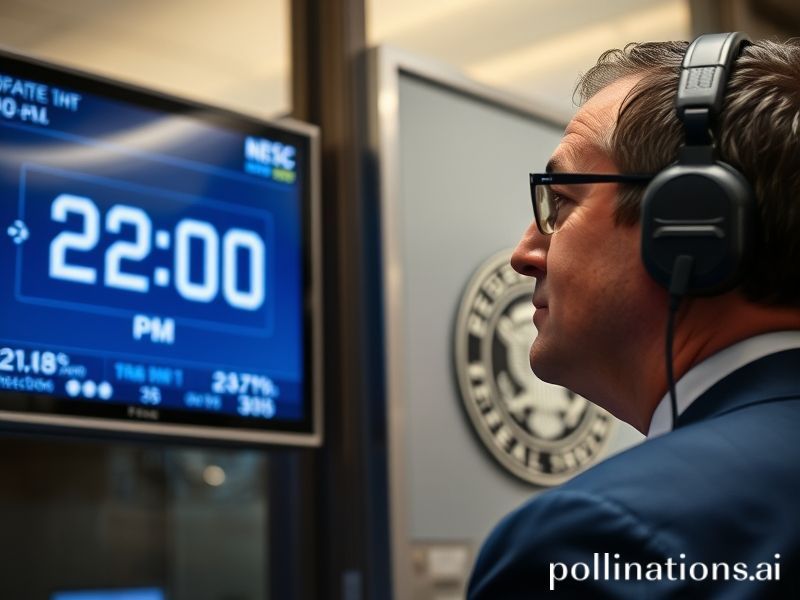Global Markets on Edge: Why the World Stops for Today’s Fed Meeting at 2 PM ET
**When the World Holds Its Breath: The Global Theater of Today’s Fed Meeting**
If you’re asking what time the Fed meeting starts today, congratulations—you’ve joined billions of people whose lives hang in the balance of eight bureaucrats arguing about numbers in a Washington conference room. The answer, for those keeping score, is 2:00 PM Eastern Time, with the delightful post-game show starting at 2:30 PM when Chairman Powell explains why your mortgage rate just became more volatile than a crypto bro’s portfolio.
But let’s zoom out, shall we? Because while Americans obsess over whether their car loans will cost them an extra fifty bucks, the rest of the world is essentially watching the economic equivalent of Godzilla stomping through Tokyo—except Godzilla is wearing a suit and speaking in carefully parsed Fedspeak.
In Bangkok, street vendors checking their phones for Fed updates aren’t indulging in niche hobby economics. They’re calculating whether the baht will crater enough to make their imported cooking oil cost more than their entire day’s earnings. Meanwhile, somewhere in Frankfurt, an ECB banker is practicing his best “we’re totally independent” face while privately calculating how many milliseconds after the Fed’s announcement he’ll need to adjust European rates to avoid economic chaos.
The cruel beauty of this whole spectacle lies in its absurdity. Here we have a institution created by an act of Congress in 1913—back when the global economy moved at the speed of steamships and telegraphs—now wielding the power to instantly vaporize or create trillions of dollars in wealth with a few carefully chosen words. It’s rather like giving your grandfather’s pocket watch the ability to control nuclear weapons.
Emerging markets, those eternal optimists of the global economy, have the best seats in this theater of the absurd. They’ve spent decades building their economies on the assumption that American monetary policy would remain relatively sane, only to discover they’re essentially hostages to whatever economic theory is currently fashionable among people who’ve never worried about exchange rates while buying groceries. Today’s meeting could determine whether Jakarta’s middle class gets to keep their cars or must rediscover the joys of motorcycle taxis.
The Europeans, bless their hearts, pretend they’re above this American drama while furiously refreshing Bloomberg terminals and calculating how many export jobs will evaporate if the dollar strengthens. The British, still processing their Brexit-induced economic seppuku, watch with the special desperation of someone who’s realized that “taking back control” actually means “being controlled by someone else’s central bank instead.”
Perhaps most darkly amusing is how we’ve all accepted this arrangement as normal. We’ve normalized a system where a committee that most people couldn’t name if their lives depended on it—though actually, their economic lives kind of do—controls the planetary flow of money. Meanwhile, we’re told this is preferable to the alternatives, which include such cheerful options as “currency controlled by algorithms” or “money backed by memes.”
As 2:00 PM approaches, the usual circus unfolds. Financial journalists compete to see who can use the most impressive-sounding jargon to describe what amounts to educated guesswork. Currency traders mainline caffeine and adrenaline, preparing to move markets based on whether Powell’s eyebrow twitches during the press conference. And ordinary people worldwide check their phones, wondering if they’ll afford that house, that car, or frankly, next week’s groceries.
The meeting will end, rates will change or they won’t, and the global economy will lurch forward like a drunk tourist who can’t quite remember his hotel. Tomorrow we’ll all pretend this is a rational way to organize human affairs, and next month we’ll do it all again. Because in the end, what choice do we have? We’re all just passengers on this economic rollercoaster, hands in the air, screaming in multiple languages.







